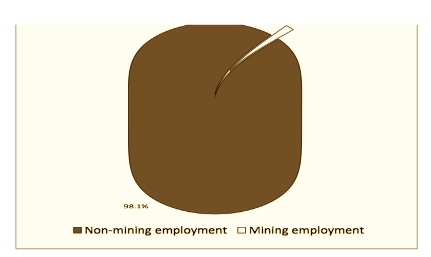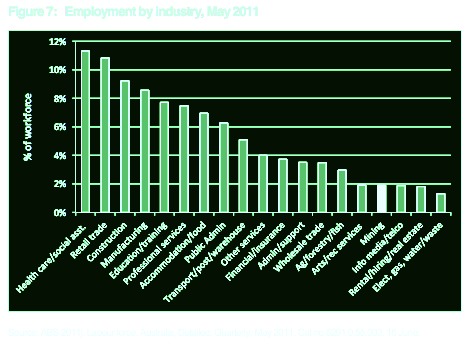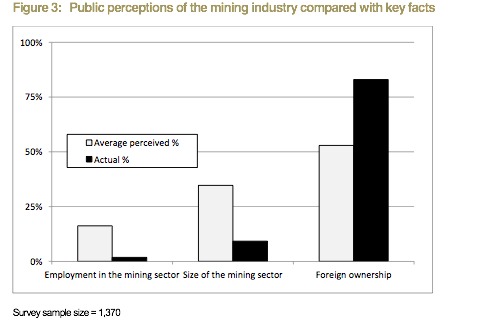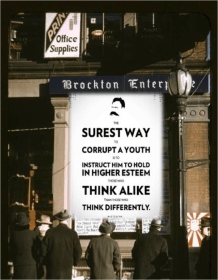“That great eccentric of the Enlightenment, Georg Christoph Lichtenberg, who put into his private notebooks just about everything that came into his head, once jotted down: “Whoever decreed that a word must have a fixed meaning?” He was perhaps the first to recognize the psychic constraint involved in the perception of meaning and the attempt to make it firm…
Charles Rosen’s expansive and amazing piece continues in full & @ no charge…click here
Archive for April, 2012
The whole aim of practical politics is to keep the populace alarmed, and hence clamorous to be led to safety, by menacing it with an endless series of hobgoblins, all of them imaginary.
H. L. Mencken
“Dramatic, slimy events in Australian politics. Country desperately needs election to get fresh start.”
Rupert Murdoch via twitter 28th April ’12
An interpretOr grew up among drastic, slimy events in UK politics with Murdoch and his minions at their rotten core.
The man has no shame. But then again, that’s pretty run of the mill for odious sociopaths. Slimy…
“On my first day as prime minister, I would pick up the phone to the President of Nauru to accept Nauru’s bi-partisan, standing offer to reopen the detention centre there.
Within a week of taking office, I would give new orders to the navy that, where it is safe to do so, under the usual chain-of-command procedures, based on the advice of commanders-on-the-spot, Indonesian flagged, Indonesian crewed and Indonesian home-ported vessels without lawful reason to be headed to Australia would be turned around and escorted back to Indonesian waters.”
‘LANDMARK SPEECH (sic): THE COALITION’S PLAN FOR MORE SECURE BORDERS’
Tony Abbott, 27th April 2012
(Executive Director of Australians for Constitutional Monarchy 1993/94)
“One cannot believe people are comparing Rupert Murdoch to Satan. Yes, he’s evil, but he’s not as bad as Rupert Murdoch.”
Nick Davies of the Guardian broke the ‘News’ (sic) phone hacking story and updates on the Murdochs at the Leveson inquiry as follows:
David Cameron could be in jeopardy if the alleged support for the BSkyB bid proved to be part of a deal with the Tories.
Critics of the Murdochs have often suspected that they have exploited their position as newspaper owners to win secret favours from governments – and the Murdochs and the politicians alike have denied it. Now, for the first time, courtesy of the volatile chain-reaction of the phone-hacking scandal, we have compelling evidence. (click here to go to Nick Davies @ the Guardian)
“We are economists who oppose ideological cleansing in the economics profession. Equally we oppose political cleansing in the vital debate over the causes and consequences of our current economic crisis.
We support the efforts of the Occupy Wall Street movement across the country and across the globe to liberate the economy from the short-term greed of the rich and powerful one percent.
We oppose cynical and perverse attempts to misuse our police officers and public servants to expel advocates of the public good from our public spaces.
We extend our support to the vision of building an economy that works for the people, for the planet, and for the future, and we declare our solidarity with the Occupiers who are exercising our democratic right to demand economic and social justice.”
Gerald Epstein / University of Massachusetts Amherst
James K. Boyce / University of Massachusetts Amherst
Taro Abe / Nagoya Gakuin University
Fikret Adaman / Bogazici University
Bengi Akbulut / University of Manchester
Randy Albelda / University of Massachusetts Boston
Michael Albert / Z Communications
Sylvia A. Allegretto / University of California Berkeley
Gar Alperovitz / University of Maryland
Jack Amariglio / Merrimack College
Nurul Aman / University of Massachusetts Boston
Miguel Arce / Universidad del Valle
Michael Ash / University of Massachusetts Amherst
Enid Arvidson / University of Texas at Arlington
Dennis Badeen / York University
Lee Badgett / University of Massachusetts Amherst
Ron Baiman / Center for Tax and Budget Accountability
Dean Baker / Center for Economic and Policy Research
Samuel L. Baker / Purdue University
Scott Baker / Public Banking Institute
Erdogan Bakir / Bucknell University
Benjamin Balak / Rollins College
Radhika Balakrishnan / Rutgers University
Fabian Balardini / Borough of Manhattan Community College
Nesecan Balkan / Hamilton College
Ahmet Baytas / Montclair State University
Nina Banks / Bucknell University
Sundari Baru
Deepankar Basu / University of Massachusetts Amherst
Michael Beggs / University of Sydney
José Bellver/ Complutense University of Madrid
Suzanne Bergeron / University of Michigan Dearborn
Ravi Bhandari / St. Mary’s College
Marc Bilodeau / Indiana University – Purdue University Indianapolis
Cyrus Bina / University of Minnesota
Peter C. Bloch / University of Wisconsin-Madison
Raford Boddy / San Diego State University
Roger Evan Bove / West ChesterUniversity
Elissa Braunstein / Colorado State University
Garth A. Brazelton / Indiana Economic Development Corporation
Neil Brenner / Harvard University
Ted Burczak /Denison University
Antonio Callari / Franklin and Marshall College
Isabela Prado Callegari – São Paulo School of Economics
Duncan Cameron / Canadian Centre for Policy Alternatives
Al Campbell / University of Utah
Gerald Campbell / University of Wisconsin Madison
Martha Campbell / Potsdam College (SUNY)
Emanuele Campiglio / New Economics Foundation
Juan Camilo Cardenas / Universidad de Los Andes
Bruce E. Carpenter / Mansfield University
Jessica Carrick-Hagenbarth / University of Massachusetts Amherst
Scott Carter / University of Tulsa
Hugo E. A. da Gama Cerqueira / Universidade Federal de Minas Gerais
Paresh Chattopadhyay / University of Quebec
Robert Chernomas / University of Manitoba
Savvina Chowdhury / Evergreen State College
Jens Christiansen / Mount Holyoke College
Kimberly Christensen / Sarah Lawrence College
Alan B. Cibils / Universidad Nacional de General Sarmiento
Jennifer Cohen / University of Massachusetts Amherst
Steve Cohn / Knox College
Alessio Conti / University of Rome
Paul Cooney / Universidade Federal do Pará
Evelyn B. Córdova / La Universidad del Zulia
James V. Cornehls
Lilia Costabile / University of Naples
J. Kevin Crocker / University of Massachusetts Amherst
James Crotty / University of Massachusetts Amherst
James M. Cypher / Universidad Autónoma de Zacatecas
Omar S. Dahi / Hampshire College
Anita Dancs / Western New England University
Adel Daoud / University of Gothenburg
Leila Davis / UMass Amherst
Erik Dean / University of Missouri Kansas City
Carmen Diana Deere / University of Florida
Chase DeHan / University of Utah
Francois Delorme / Association des Economistes Québécois
Joao Paulo de Souza / University of Massachusetts Amherst
George DeMartino / University of Denver
Serkan Demirkilic / University of Massachusetts Amherst
Maarten de Kadt
Hans Despain / Nichols College
Carlo D’Ippoliti / Sapienza University of Rome
Jonathan Diskin / Earlham College
Geert Dhondt / City University of New York
David Donald / Glasgow Caledonian University
Peter Dorman / Evergreen State College
P.K. Dollar / PI Marketing Research
Laura Dresser / Center on Wisconsin Strategy
Mathieu Dufour / City University of New York
Lynn Duggan / Indiana University Bloomington
Anil Duman / Central European University
Amitava Krishna Dutt / University of Notre Dame
Gary Dymski / University of California Riverside
Marie Christine Duggan / Keene State College
Nina Eichacker / University of Massachusetts Amherst
David Ellerman / University of California at Riverside
Benan Eres / Ankara University
Bilge Erten / United Nations, DESA
Paula Esteves / Federal University of Minas Gerais
Joshua Farley / University of Vermont
Ramon Garcia Fernandez / Universidade Federal do ABC
Antonio J. Fernos-Sagebien / Universidad Interamericana de Puerto Rico
Kade Finnoff / University of Massachusetts Boston
Nancy Folbre / University of Massachusetts Amherst
Michael Fortunato / Williams College
Robert Francis / Shoreline Community College
L. Carlos Freire-Gibb / Aalborg University
Gerald Friedman / University of Massachusetts Amherst
James K. Galbraith / University of Texas Austin
Robert F. Garnett / Texas Christian University
Heidi Garrett-Peltier / University of Massachusetts Amherst
David George / La Salle University
Armagan Gezici / Keene State College
Norman Glickman / Rutgers University
David Gold / The New School
William W. Goldsmith / Cornell University
Don Goldstein / Allegheny College
Jonathan P. Goldstein / Bowdoin College
Christian Gormsen / Centre d’Economie de la Sorbonne
Mitch Green / University of Missouri Kansas City
Robin Hahnel / American University
Jane V. Hall / California State University Fullerton
Jay P. Hamilton / City University of New York
Amy Hart / University of Sydney
Martin Hart-Landsberg / Lewis and Clark College
James Heintz / University of Massachusetts Amherst
John F. Henry / University of Missouri Kansas City
Doug Henwood / Left Business Observer
Arturo Hermann / ISTAT
Ivan-Dario Hernandez-Umaña / Universidad Nacional de Colombia
Conrad M. Herold / Hofstra University
Marianne Hill / Mississippi Center for Policy Research
Rod Hill / University of New Brunswick
Michael G. Hillard / University of Southern Maine
Larry Hochendoner / World Health Care Infrastructures
Wolfgang Hoeschele / Truman State University
Joan Hoffman / City University of New York
Sue Holmberg / University of Massachusetts Amherst
Kiaran Honderich / Williams College
Jong Haak Hong / Kyungwon University
Barbara Hopkins / Wright State University
Julio Huato / St. Francis College
Alan Hutton / Glasgow Caledonian University
Prue Hyman / Victoria University of Wellington (ret.)
John Ikerd / University of Missouri
Ruth Indeck / Economy Connection
Ryan Isakson / University of Toronto
Jean Jacobson / University of Minnesota Duluth
Frederic B. Jennings Jr. / Center for Ecological Economics and Ethical Education, Ipswich, MA
Tae-Hee Jo / Buffalo State College
Calanit Kamala / UC Berkeley
Emily Kawano / University of Massachusetts Amherst
Seçil Aysed Kaya / Ankara University
Serap A. Kayatekin / American College of Thessaloniki
Steve Keen / University of Western Sydney
Mehmet Rauf Kesici / Kocaeli University
Marlene Kim / University of Massachusetts Boston
Yun Kyu Kim / Trinity College
Mary C. King / Portland State University
Stephen Kinsella / University of Limerick
Robert Kirsch / Virginia Tech
Gerda Kits / The King’s University College
Mark Klinedinst / University of Southern Mississippi
Tim Koechlin / Vassar College
Charles Komanoff / Carbon Tax Center
Charalampos Konstantinidis / University of Massachusetts Amherst
Katharine Kontak / Bowling Green State University
Gonca Konyali / Dokuz Eylul University
David Kotz / University of Massachusetts Amherst
Philip Kozel / Rollins College
David Kristjanson-Gural / Bucknell University
David Laibman / City University of New York
Eric Larsen / Public Policy Institute of California
Mehrene Larudee / Al-Quds Bard Honors College
Michael A. Lebowitz / Simon Fraser University
Chai-On Lee / Chonnam National University
Frederic Lee / University of Missouri Kansas City
Fernando Leiva / University at Albany (SUNY)
Gianmarco Leon / UC Berkeley
Charles Levenstein / University of Massachusetts Lowell
Margaret Levenstein / University of Michigan
Gerald Levy / LaGuardia Community College (CUNY)
Richard Lichty / University of Minnesota Duluth
Patricia J. Lindsey
Antonio Lopes / Second University of Naples
Sean MacDonald / City University of New York
Arthur MacEwan / University of Massachusetts Boston
Fiona Maclachlan / Manhattan College
Brian K. MacLean / Laurentian University
Allan MacNeill / Webster University
Claudio Fernández Macor / Universidad Nacional del Litoral
Yahya M. Madra / Boğaziçi University
Rasigan Maharajh / Tshwane University of Technology
Eric Malm / Cabrini College
Carlos Marentes / University of Massachusetts Amherst
Stephen A Marglin / Harvard University
John E. Peters / Marist College
Wesley Marshall / UAM-Iztapalapa
Stephanie Martin / Allegheny College
Thomas Masterson / Levy Economics Institute of Bard College
Julie Matthaei / Wellesley College
Peter Hans Matthews / Middlebury College
Matthew May / University of Missouri Kansas City
Elaine McCrate / University of Vermont
H. Neal McKenzie
Andrew Mearman / University of the West of England, Bristol
Matthieu Meaulle / Foundation for European Progressive Studies
Michael Meeropol / Western New England University
Ralph Meima / Marlboro College Graduate School
César Viteri Mejía / University of Massachusetts Amherst
John D. Messier / University of Maine Farmington
Peter B. Meyer / University of Louisville
James Miehls / University of Massachusetts Amherst
John A. Miller / Wheaton College
Rob Moir / University of New Brunswick
Gary Mongiovi / St. John’s University
Fred Moseley / Mount Holyoke College
Albert Mosley / Smith College
Tracy Mott / University of Denver
Jamee K. Moudud / Sarah Lawrence College
Adil Mouhammed / University of Illinois at Springfield
Catherine P. Mulder / City University of New York
Marta Murray-Close / University of Massachusetts Amherst
Ellen Mutari / The Richard Stockton College of New Jersey
Sirisha Naidu / Wright State University
Michele Naples / The College of New Jersey
Kamran Nayeri / University of California Berkeley
Jessica Gordon Nembhard / City University of New York
Julie A. Nelson / University of Massachusetts Boston
Emil Nieves-Mounier / Government Development Bank of Puerto Rico
Eric Nilsson / California State University San Bernardino
Richard B. Norgaard / University of California Berkeley
Jennifer Olmsted / Drew University
Erik Olsen / University of Missouri Kansas City
Ozlem Onaran / University of Westminster
Hiroshi Onishi / Kyoto University
Miguel Otero-Iglesias / ESSCA – School of Management
Cem Oyvat / University of Massachusetts Amherst
Aaron Pacitti / Siena College
Thomas Palley / New America Foundation
Susan Parks / University of Wisconsin-Whitewater
Eva Paus / Mount Holyoke College
Samuel R Pavel / Southern Illinois University Carbondale
Karl Petrick / Western New England University
Nicolas Pons-Vignon / University of the Witwatersrand
Manisha Pradhananga / University of Massachusetts Amherst
Robert E. Prasch / Middlebury College
Paddy Quick / St. Francis College
Peter Radford
Elizabeth A. Ramey / Hobart and William Smith Colleges
Wendy Rayack / Wesleyan University
Arslan Razmi / University of Massachusetts Amherst
Jack Reardon / Hamline University
Angelo Reati
Joseph Rebello / University of Massachusetts Amherst
Sanjay G. Reddy / The New School for Social Research
Robert Reinauer / Rollins College
Stephen Resnick / University of Massachusetts Amherst
Cecilia Rio / Towson University
Meenakshi Rishi / Seattle University
Judith Robinson / Castleton State College
Igor Lopes Rocha / University of Cambridge
John Roche / St. John Fisher College
Charles P. Rock / Rollins College
Leopoldo Rodriguez / Portland State University
Frank Roosevelt / Sarah Lawrence College
Luis D. Rosero / Fitchburg State University
Sergio Rossi / University of Fribourg
David F. Ruccio / University of Notre Dame
Héctor Sáez / University of Massachusetts Amherst
Blair Sandler / University of Massachusetts Amherst
John Sarich / Cooper Union for the Advancement of Science and Art
Daniel E. Saros / Valparaiso University
Harwood D. Schaffer / University of Tennessee Institute of Agriculture
Helen Scharber / Hampshire College
Ted P. Schmidt / Buffalo State College
John Schmitt / Center for Economic and Policy Research
Alyssa Schneebaum / University of Massachusetts Amherst
Markus P. A. Schneider / University of Denver
Juliet Schor / Boston College
Eric A. Schutz / Rollins College
Elliott Sclar / Columbia University
Mario Seccareccia / University of Ottawa
Ian J. Seda-Irizarry / University of Massachusetts Amherst
Kristen Sheeran / Economics for Equity and the Environment
Barry Shelley / Brandeis University
Laurence Shute / California State Polytechnic University Pomona
Elizabeth Sloan / University of Utah
Ceren Soylu / University of Massachusetts Amherst
Peter Spiegler / University of Massachusetts Boston
Janet Spitz / The College of Saint Rose
Jim Stanford / Canadian Auto Workers
Liz Stanton / Tufts University
Martha A. Starr / American University
Howard Stein / University of Michigan
Mark Stelzner / University of Massachusetts Amherst
Tamara Stenn / Keene State College
John Stifler / University of Massachusetts Amherst
Engelbert Stockhammer / Kingston University
Ian C. Strachan / Nichols College
Sarah Surak / Virginia Tech
Behrouz Tabrizi / St. Francis College
Janet M. Tanski / University of Missouri
Linwood Tauheed / University of Missouri Kansas City
Kenna Taylor / Rollins College
Pavlina R. Tcherneva / Franklin and Marshall College
Hasan Tekgüç / Mardin Artuklu University
Frank Thompson / University of Michigan
Jim Tober / Marlboro College
Zdravka Todorova / Wright State University
Junji Tokunaga / University of Massachusetts Amherst
Mariano Torras / Adelphi University
Mayo Toruño / California State University San Bernardino
Andrew Trigg / Open University
A. Dale Tussing / Syracuse University
Eric Tymoigne / Lewis and Clark College
Salimah Valiani / Ontario Nurses’ Association
Hendrik Van den Berg / University of Nebraska – Lincoln
Marjolein Van Der Veen
Nick Velluzzi / Walla Walla Community College
Roberto Veneziani / Queen Mary University of London
Matías Vernengo / University of Utah
Valerie Voorheis / University of Massachusetts Amherst
Mwangi wa Gĩthĩnji / University of Massachusetts Amherst
Daniel G. Weaver / Rutgers University
Thomas E. Weisskopf / University of Michigan
Julian Wells / Kingston University
Scott A. Weir / Wake Technical Community College
Anastasia C. Wilson / University of Massachusetts Amherst
Maggie Winslow / Presidio Graduate School
Marty Wolfson / University of Notre Dame
L. Randall Wray / University of Missouri Kansas City
Yavuz Yaşar / University of Denver
Michael D. Yates / University of Pittsburgh at Johnstown
Jong-Il You / KDI School of Public Policy and Management
Ajit Zacharias / Bard College
Jeffrey Zink / Morningside College
Barbara Zoloth
Klara Zwickl / University of Massachusetts Amherst
Capra-baldie-baddies WoOpert Murd and lil’ jimmy are to appear at the Leveson Inquiry in London Tues and Weds of next week, with a resonant focus upon their relationships with…POLITICIANS…
Ooo, err…ghosts of Christmas past spring immediately to mind and may haunt the father and son team…Thatcher and Woopert at Chequers for successive X-mas lunches…time for more crackers, Woopert! Now, put your hat on, man… Bliar, Bliar, pants on fire. Well, Dave Cameron and a certain Christmas lunch with Webeka Crooks and lil’ jimmy…The Leveson Inquiry menu for next week’s hearing reads as follows…
Module 3: The Relationship between Press and Politicians
- 2012
-
Monday 23 April – Aidan Barclay, Evgeny Lebedev [35]
-
Tuesday 24 April – James Murdoch [35]
-
Wednesday 26 April – Rupert Murdoch [35)
The Australian and the Gay News Network reporting that Opposition Leader Tony Abbott had his Sunday night dinner interrupted by gay marriage advocates who surrounded his table at a Lygon Street café in Melbourne.
‘Abbott was dining with The Australian’s foreign editor Greg Sheridan when the protestors entered, confronted Abbott and began chanting ‘Tony Abbott you’re a bigot, gay marriage you don’t dig it’.’
The startled couple reacted to the onslaught in a relatively restrained manner, with Sheridan reinforcing that they have no imminent marriage plans.
The Australian Government is struggling to find a legislative solution to problem gambling that is both politically acceptable and socially responsible. Although a big majority of Australians support regulation, the government is faced with a highly funded campaign by the gambling industry targeting Labor marginal seats.
Gambling organisations, and particularly the poker machine vendors, claim the legislation is too cumbersome to be administered and that their resultant losses would shut down many community sporting clubs and community facilities if imposed on them.
Under huge backbench pressure, the Gillard government has already backed off on an agreement with Tasmanian independent member Andrew Wilkie who jointly holds the balance of power in the House of Representatives.
Mr Wilkie’s support for the Gillard Government was dependent upon an agreed limit to be imposed on problem gamblers and the rate of expenditure slowed down so that families were not left starving or facing eviction because of excessive addictive gambling.
Here is a possible solution. All business as well as the gambling industry have being pushing for less regulation and want that legislation to be modified by agreement to make it more workable for their particular business rather than one size fits all regardless of their size or what unique circumstances effect their business.
This is how it could work for the gambling industry. Given that 40% of revenue comes from addicted problem gamblers, the government fixes a 40% tax on all revenue from gaming machines. The vendors are then required to impose rules on gamblers to significantly reduce or ameliorate problem gambling in their particular venue.
This solution can be registered with the government and if the vendor provides proof that their rules are effective, the rules can be put before parliament as subsidiary legislation. If the vendor rules are approved by parliament the vendor gets a reduction in their tax rate.
The subsidiary legislation is to be reversible if the rules are seriously breached, or shown to be not effective. Other vendors can adopt these rules, or register their own rules if they do not suit their business. For instance, rules that work for community centres may not work for a big casino.
The beauty of this method is that it makes the vendors responsible for finding their own solutions otherwise they are hit with a large tax bill. The government role is simply policing the venues to make sure the rules are being properly applied. No more heavy hand of government and a strong incentive for the industry to act responsibly. Most importantly the taxpayers are not picking up the bill for destitute families who are victims of gambling, it is the industry cleaning up its own mess.
Videorative Portrait of Randall Okita…
“a picture of the mind… a map of emotions…painted with meanings”
“It is interesting to pick one’s way through the obstacles of censorship, but freedom can’t be stopped in the internet age…”
click here for Ai Weiwei’s piece in today’s Guardian
Two of Britain’s largest lobbying firms have launched bids to help big business exploit the European Citizens’ Initiative – a new programme that was meant to involve ordinary people in European Union law-making, The Bureau of Investigative Journalism has reported, (10/04/12).
A leaked memo shows that Thatcherite PR/Propaganda consultancy Bell Pottinger, the subject of an undercover investigation published by the Independent (UK) and the Bureau of Investigative Journalism in December last year, has offered to help potential clients set up petitions demanding changes to EU law under the new programme, whose rules specifically bar organisations from doing so.
And information posted on the website of its fellow lobbyist Fleishman-Hillard shows it too is offering to help businesses hijack the initiative, which came into force on 1 April.
“They are trying to muscle in. We have done everything we can to try to put safeguards in place to discourage that from happening,” said an aide to Maros Sefcovic, the European Commission’s vice-president, who is responsible for setting up the initiative.
The revelations will put more pressure on David Cameron to take action over lobbying firms based in Britain. In February 2010, he made a speech warning that lobbying in Westminster was “an issue that exposes the far-too-cosy relationship between politics, government, business and money”.
the interpretOr would like to add that this is no isolated occurrence :
In Australia, propagandists such as the IPA (Institute of Public Affairs) are able to offer tax deductions to their corporate donors without having to make the relationship public. IPA talking heads appear on a regular basis across broadcast media, including the ABC. In addition, they succeed in filling the op-ed pages of newspapers and online platforms.
IPA: Independent? Nope. In the public interest? Hardly.
The scene: Woopert is in his vertical fortress, top of the boardroom and barking commands to his minions and t’ings: “Streuth Harridan, we ready to go on this, for fxxx’s sake!!” …”yes, yes, your Excellency. Wired for sound…signal coming through just…about…now…”
– Prince C, me old mate…it’s me, Cliffy…
Wherrr, mmm, welll, Sir Clifford. Dear, dear Sir Cliff. How is one this evening?
– pumped up and poptastic! Twirling around me little ol’ plantation…
Well, one wants…one wants wather very much to be, to be…erhmphh…
– mega! I get the drift, me old mate…”Or not to be…?”
Nooo, nooo, noo man. Not not to beeee!!!
– coolio…not, not to be…then…
Whell, tooo bee…uhmaa
– look me old Bonnie Prince Charlie, to be, or not to be? Take yerr pick, nooo?
To be…one wants to be…one wants to be an organic carrott…
– your Princetasticness…it’s orange ‘nd a la mode, err…orangetastic…
Woopert swiveled round in his large leather throne and shot a whithering glance at Harridan – “Tame. Tame and lame!! And Harridan…what’s with those goddd damnnn sandals!?”
Apple is cheating and ripping off Australian consumers. Apple launched its new iPad in Australia saying it was compatible with the Telstra 4G network but consumers found that it used the wrong frequency. Apple is offering refunds to buyers who were mislead.
While this could have been an oversight because it is compatible with other Australian 4G networks, its overcharging of Australian consumers is a deliberate rip off.
In Australia the prices for the new iPad is A$539.00 or in US dollars $562.00 while US consumers pay just US $499.00. The iPad 2 is $447.00 in Australia and $399.00 in the US. Given that the iPads are made in China, the freight cost should be pretty much the same. Apple will not allow anyone from Australian postcodes to buy from its US store to bypass this price differential.
So when you buy your iPad in Oz just think of those poor Americans you are subsidizing. Just like Australian taxpayers helping to pay to support the US Government oil wars in the Middle East they have come to expect it of us.
 So, tell me Tony. How the devil are you, my dear chep?
So, tell me Tony. How the devil are you, my dear chep?
Well, uhmmm Lord Christopher. Smashing to hear from you.
The bicycle, Tony. Is the bicycle working?
Why yes, Lord Chrissie. The bicycle is working, erhhmph, literally and metaphorically…The boys at News were right, ya know. Leni too. I feel quite at home now in my cycling pants.
Symbolism of cycling in the modern age. Bowis Johnson and Dave Cameron bicycling gave the public the warm and fuzzies. “Smoke scweens” shweeked the latte cwowd…
Cognitive dissonance, or uhmm, something like that…but really, Campbell’s off to a strong start and Clive’s tickled pink, err, very pleased.
Is it twue, dear Tony, is it weally twue thet Flinty’s weleased video tape cassettes of the Windsors?
Yes. ACM are really pushing the envelope and engaging with the youngsters. The opportunity for cadet Australian’s to see Prince Charles letting his hair down and disco dancing with Sir Cliff. Quite frankly, stirring stuff. David has even provided voice over on poignant segments.
Smeashing. The dulcet tones.
Phase Four is firming up with ‘opportunity to win’ soon to be ubiquitous. Campbell’s implementing library closures as a priority and when I acquire my rightful place, the internet will be the exclusive preserve of Seven Media, News and Gina.
As it ought to be, dear Tony. And as it shall be.
At the end of the day, Lord Chrissie…quite frankly, yes.
Al Jazeera breaking that a tsunami warning has been issued in the Indian Ocean after Indonesia’s geophysical agency reported a powerful earthquake off Aceh province.
Wednesday’s quake was measured at a preliminary 8.9-magnitude.
This graph is derived from Australian Bureau of Statistics, ‘Labour force Australia’, 2011.
Imagined employment levels in the mining sector, as conveyed by ongoing cheesy ‘Our Story’ mining lobby adverts, give the impression that the sector employs so many millions of Australians that we should all quit the day job and go FIFO…
source: The Australia Institute: click here for their home page
Al Jazeera and wires breaking that Anonymous has hacked into home pages of Chinese government websites. Online visitors were this morning greeted with Anonymous planted messages:
“Chinese people, the government controls the internet in your country and strives to filter what it considers a threat to it..”
… France, election time; Syria deadlocked;Nigeria and Boko Haram; Mali coup further fragilises the Sahel; the Sahara’s long struggle; where microcredit went wrong;Portugal’s school for austerity; special report:can the West reindustrialise? Nepal’s blocked revolution; global cities of the Levant; before the Big Bang…and more…
“Le Monde diplomatique is a crusading voice in journalism with especially good foreign coverage”
William Dalrymple
“A man whose lies helped to make the case for invading Iraq – starting a nine-year war costing more than 100,000 lives and hundreds of billions of pounds – will come clean in his first British television interview tomorrow….” (the Independent: 03/04/12)
click for more at the Independent
“China’s influential microblogs, which over the last few years have emerged as a challenge to the monopoly of the state media, have fallen silent for the first time after being penalised over the spread of coup rumours.
Two major Chinese microblogging sites, weibo.com and t.qq.com, known as Chinese Twitters with about 300 million microblogger subscribers have suspended comment functions after they were punished for allowing rumours to spread, state run Shanghai Daily reported.” DNA India.
more at www.dnaindia.com/world/report_china-s-microblog-media-falls-silent-for-first-time_1670182
China’s Death-Row Reality Show:
“Until it was taken off the air last December, one of the most popular television programs in China’s Henan province, which has a population of 100 million, was “Interviews Before Execution.” The presenter was Ding Yu, a pretty young woman, always carefully dressed with colorful scarves and blouses; in each episode, she would interview on camera a condemned murderer who was about to face a firing squad or a lethal injection….” New York Review of Books, March 2012.
This fascinating article at the New York Review of Books continues in full at: executionshOw@NYRevBks






















